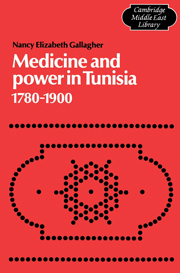Book contents
- Frontmatter
- Contents
- Illustrations
- Acknowledgments
- Note on transliteration
- Abbreviations
- Introduction
- 1 Indigenous medicine against plague, 1780–1830
- 2 Cholera in an age of European economic expansion, 1830–58
- 3 Cholera, typhus, and economic collapse, 1858–70
- 4 Colonization and collapse of Arab medical institutions
- Conclusion
- APPENDIX A Waqf (hubus) document for the maristan of Tunis
- APPENDIX B Letter from Husayn Bey to de Lesseps on reasons for the quarantine
- APPENDIX C Epidemics and population trends
- Notes
- Glossary
- Bibliography
- Index
Conclusion
Published online by Cambridge University Press: 23 November 2009
- Frontmatter
- Contents
- Illustrations
- Acknowledgments
- Note on transliteration
- Abbreviations
- Introduction
- 1 Indigenous medicine against plague, 1780–1830
- 2 Cholera in an age of European economic expansion, 1830–58
- 3 Cholera, typhus, and economic collapse, 1858–70
- 4 Colonization and collapse of Arab medical institutions
- Conclusion
- APPENDIX A Waqf (hubus) document for the maristan of Tunis
- APPENDIX B Letter from Husayn Bey to de Lesseps on reasons for the quarantine
- APPENDIX C Epidemics and population trends
- Notes
- Glossary
- Bibliography
- Index
Summary
Social historians have seized upon epidemics and their effects on people's lives as fundamental causes or ‘motors of human history’ and as unique sources of historical insight. In the case of Tunisia from 1780 to 1900, epidemics were indeed of major significance, being barometers of social change, catalysts of medical reform, and even justification for political power. But contrary to the analyses of many contemporary observers and modern historians, the epidemics did not cause the economic destabilization that characterized the history of nineteenth-century Tunisia.
Mortality and history
Following the severe plague of 1785–6, the Tunisian economy apparently fared well, and there was no political instability that can be associated with the high mortality caused by the disease. The economic recession that followed the 1818–20 plague resulted from complex international commercial and political developments that reversed Tunisia's trade advantages. In the 1830s and 1840s, a succession of unequal trade treaties imposed by militarily superior European powers led the beys to instigate multifaceted reforms that stressed expansion of their own armed forces. Increased taxes to support the reforms and to redress public (governmental) loss of commercial revenue further distorted the indigenous economy. The agricultural recession that accompanied the 1849–50 cholera epidemic was largely a consequence of overtaxation and lack of investment capital. Immediately following the 1856 epidemic, agriculture prospered due to regularized taxation and favorable weather. In 1867–8, the cholera and typhus epidemics precipitated bankruptcy and foreign takeover of Tunisian finances.
- Type
- Chapter
- Information
- Medicine and Power in Tunisia, 1780–1900 , pp. 97 - 101Publisher: Cambridge University PressPrint publication year: 1983

